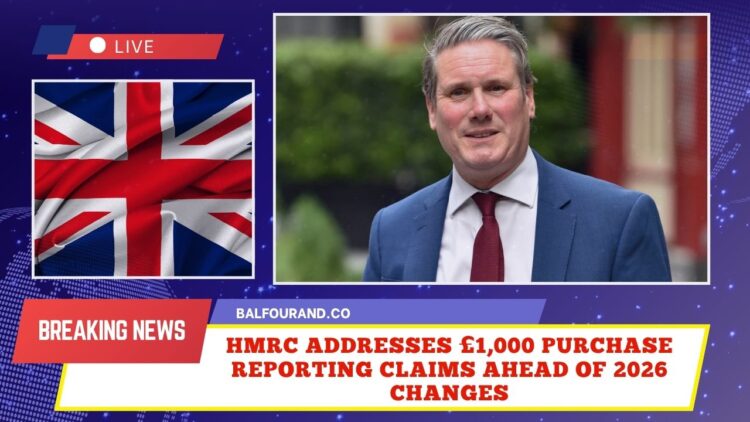The HM Revenue and Customs (HMRC) has issued a formal statement following widespread social media claims that all purchases over £1,000 will be “automatically reported” to the tax authorities from 1 January 2026.
Posts circulating on Facebook and TikTok, some with hundreds of thousands of views, alleged that this move would be part of a “crackdown on money laundering, benefit fraud, and undeclared income.”
According to the false claims, retailers, online platforms, and even small businesses would report transactions over the £1,000 threshold directly to HMRC, with details linked to a person’s National Insurance number.
HMRC has confirmed these claims are false and described them as “disinformation designed to cause undue alarm and fear.”
The False Claims Explained
According to the viral misinformation:
- Every purchase over £1,000 would be automatically reported to HMRC.
- Data would be linked to individuals’ National Insurance numbers.
- Both card and cash transactions would be tracked, with identity verification at checkouts.
- People could have benefits suspended if spending did not match reported income.
HMRC has categorically denied that any such system is being introduced in 2026.
What HMRC Actually Plans for 2026
While the £1,000 purchase reporting claims are untrue, April 2026 will see the introduction of Making Tax Digital (MTD) for Income Tax. This is a significant update for sole traders and landlords, but it does not involve the monitoring of personal purchases.
Under MTD for Income Tax:
| Requirement | Details |
|---|---|
| Start Date | 6 April 2026 |
| Who’s Affected | Sole traders and landlords with annual income above £50,000 (initially) |
| Record Keeping | Must keep digital records of self-employment and property income and expenses |
| Reporting | Quarterly updates to HMRC via compatible software |
| Annual Submission | Final tax return due by 31 January the following year |
| Purpose | Streamline tax reporting, improve accuracy, and reduce errors |
HMRC’s Official Statement
A spokesperson for HMRC said:
“This video is disinformation, designed to cause undue alarm and fear. Anyone wanting information on rules around taxation should go to GOV.UK or seek advice from a tax professional.”
The department is urging the public to rely on official government channels rather than viral posts on social media.
Why the Rumour Spread Quickly
The false £1,000 purchase reporting story gained traction because:
- It plays into fears of increased government surveillance.
- It uses real HMRC terminology to appear credible.
- It coincides with legitimate changes coming in 2026 (MTD for Income Tax).
However, the claim that purchases will be tracked and linked to National Insurance numbers is entirely fabricated.
What You Should Do
- Ignore unverified claims on social media.
- Check your obligations if you’re a sole trader or landlord ahead of MTD implementation.
- Visit GOV.UK for accurate and up-to-date information.
- Seek advice from a qualified tax adviser if unsure about your reporting duties.
The rumour that all purchases over £1,000 will be reported to HMRC from 2026 is false. The only significant change coming in 2026 is the Making Tax Digital for Income Tax initiative, which affects certain self-employed individuals and landlords—not everyday shoppers.
To avoid falling for misleading social media claims, always confirm information through official HMRC channels and prepare early if you’re affected by the MTD rollout. This ensures compliance while avoiding unnecessary panic over non-existent rules.
FAQs
Will HMRC monitor my purchases over £1,000 from 2026?
No. HMRC has confirmed there are no plans to track or report personal purchases over £1,000.
What is happening in 2026 that affects taxpayers?
From April 2026, MTD for Income Tax will require certain sole traders and landlords to keep digital records and submit quarterly updates.
How can I confirm if a viral tax claim is true?
Always verify through the official GOV.UK website or consult a certified tax professional before acting on such claims.




